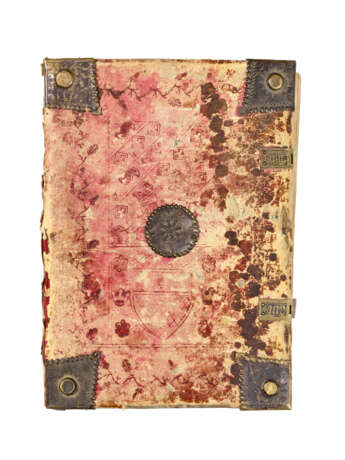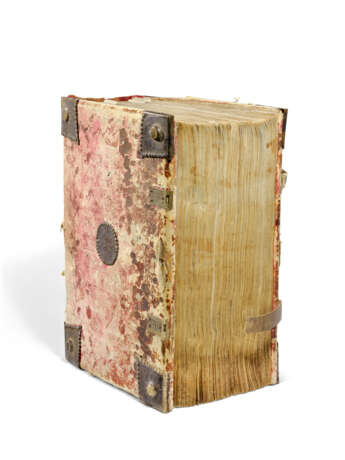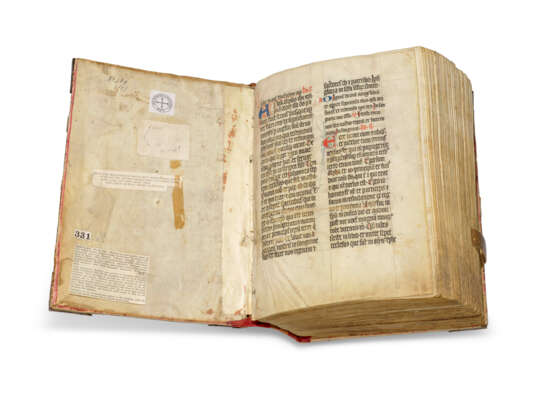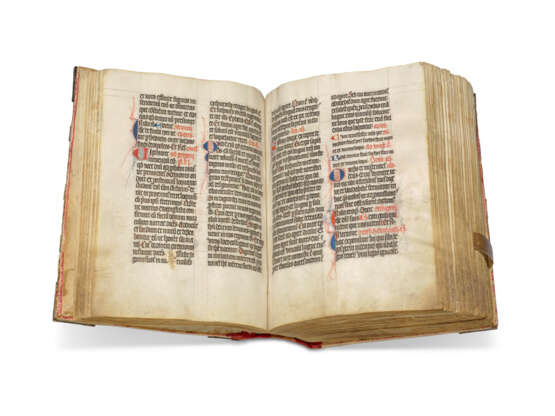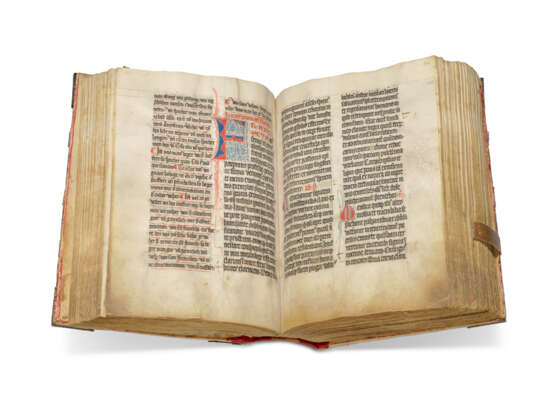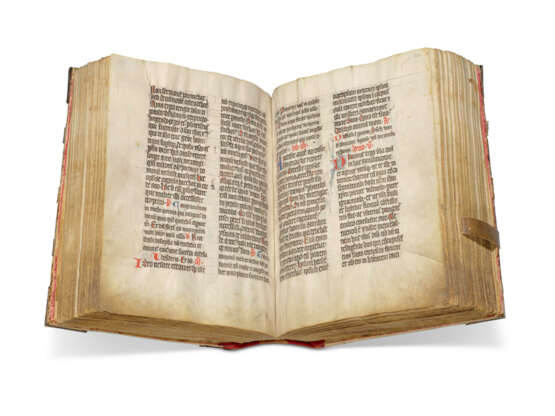ID 1214878
Lot 25 | A Franciscan Breviary
Estimate value
£ 25 000 – 35 000
Breviary of Franciscan Use, Summer part, in Latin with many and extensive rubrics in German, decorated manuscript on vellum
[Germany, 14th century]
An unusually large Breviary, in a remarkable contemporary binding.
310 × 220mm. 418 leaves, in gatherings mostly of 12 leaves, with catchwords, written in two columns of 24 lines, decorated with thirty large initials puzzle initials in red and blue with penwork infilling and extensions in the same colours, that on f.243v also with green and yellow (lacking several leaves at beginning, 2 after f.16, at least 4 after f.136, single leaves after ff.157 and 249, and probably one before and after f.417, with many effects of extended use: dirty lower corners, especially in the Common of Saints, 8 margins excised with some slight loss of text, some other cuts and tears, but generally sound and with wide margins).
Binding:
Contemporary binding sewn on five wide double bands laced into wood boards covered with pink-stained leather blind-tooled with an outer border of foliage surrounding two rectangles, the upper one with a pattern composed of lozenge-shaped stamps each enclosing a crown, a rectangular one with a dragon(?), and a scroll with a word or name read in 1984 as ‘avilla’, the lower one with crowns, fleurs-de-lis, and a large shield, engraved metal corner-pieces with raised bosses (one detached) and engraved circular centre-pieces, that on the back board missing its central boss, two clasps with metal fittings stamped ‘ave’ and ‘mari[a]’, one strap of leather blind-stamped with Renaissance ornament, the other detached and kept in an envelope (see Provenance), rebacked, preserving most of the original spine, with a 19th-century paper title-piece inscribed ‘Breviarium / manu conscript’ [sic] and a circular label printed ‘11’, in a fitted calf slip-case, its spine lettered in gilt capitals ‘Manuscript / Breviary // Fifteenth century’ with a label inscribed ‘31’ (scuffed, one boss detached, both straps defective, one detached, the front joint cracking). Box.
Provenance:
(1) The prominence of the heraldic shield on the binding suggests the possibility that it is not merely decorative, but the owner of the arms has not been identified.
(2) Unidentified German(?) collection: inscribed in the 19th century ‘No. 349 (11): front pastedown, upper outer corner; cf. the label at the base of the spine.
(3) Sotheby’s, 4 June 1934, lot 17, bought by Marks & Co., 84 Charing Cross Rd, doubtless on behalf of (see lot 20):
(4) Dawson’s, of Los Angeles, Catalogue 106 (May 1935), no 8 (a clipping from this catalogue is stuck to the front pastedown), and Catalogue 114 (Nov. 1936), no 19; doubtless bought from them by:
(5) Otto F. Ege (1888-1951) (S. Gwara, Otto Ege’s Manuscripts (2013), Handlist 149); with a paper label printed ‘331’ (probably his; the same as the ‘326’ label in the Gaetani Bible, lot 20); the front pastedown inscribed by his wife, Louise, ‘Germany 1450’; one of the clasp fittings is in an envelope inscribed ‘Mr Ege – We are very sorry about this broken clasp […] Charles Val Clear’, suggesting that the manuscript was exhibited at the Akron Art Institute, now the Akron Art Museum, of which Clear was Director, from 1945-49; sold by their heirs at Sotheby’s, 11 December 1984, lot 53; bought by:
(6) Alan Thomas (1911-1992): offered in his Catalogue 48 (1986), no 1 and pl.1, priced £6,500; acquired by:
(7) The Schøyen Collection, MS 9.
Contents:
The summer portion of a Breviary, with the Temporal (beginning imperfectly); Sanctoral from George (23 April) to Katherine (25 November), including the Translation of Francis, f.142, Anthony of Padua, f.152, Dominic, f.217, Clare, f.237, and Francis, with a vigil f.292v; Common of Saints, f.355; an added office for Louis of Toulouse (canonised in 1317), f.417.
The German rubrics are found throughout, and sometimes comprise an entire column of text or more (e.g. ff.121v, 142r–v, 401r–v). An interesting feature, revealing about the literacy and bilingualism of medieval scribes, is that the rubricator has translated most of the Latin guides into German, so, for example, the guide-note ‘liber iiii regum’ has been rendered as ‘Diz ist daz vierde bůch der kvenge’, ‘sexta nocte’ has been rendered as ‘An der sehtůn nacht’, and ‘In festo sancti martini episcopi & confessoris’ has been rendered as ‘Von sant Martin bischoff unde bihtg.’ The use of German rubrics in Latin liturgical manuscripts is often said to indicate that they were written for the use of nuns.
| Auction house category: | Medieval & renaissance manuscripts, Books and manuscripts |
|---|
| Auction house category: | Medieval & renaissance manuscripts, Books and manuscripts |
|---|
| Address of auction |
CHRISTIE'S 8 King Street, St. James's SW1Y 6QT London United Kingdom | |
|---|---|---|
| Preview |
| |
| Phone | +44 (0)20 7839 9060 | |
| Buyer Premium | see on Website | |
| Conditions of purchase | Conditions of purchase |
